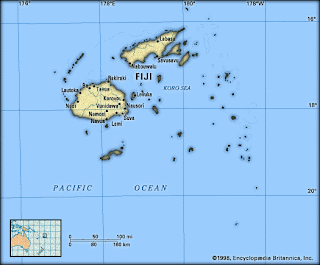The 800-plus volcanic and coral islands that make up the Pacific nation of Fiji enjoy a tropical climate and host a significant tourism industry.
However, since 1987 racial and political tensions have been a steady source of instability and international isolation.
Overview
In 1987 a coup by indigenous Fijians overthrew the elected, Indian-dominated coalition. This triggered a series of adverse events, including the introduction - and subsequent withdrawal - of a constitution enshrining indigenous Fijian political supremacy.
A further coup in 2000, led by businessman George Speight, saw the country's first ethnic Indian prime minister, his cabinet and several MPs held hostage for several weeks.
These events caused great harm to the economy - the tourism industry in particular - and Fiji's international reputation.
 Rancour over the 2000 coup persisted, with bitter divisions over plans to grant an amnesty to those behind it. The proposals underlay tensions which culminated in a bloodless military takeover in 2006 - Fiji's fourth coup in 20 years.
Rancour over the 2000 coup persisted, with bitter divisions over plans to grant an amnesty to those behind it. The proposals underlay tensions which culminated in a bloodless military takeover in 2006 - Fiji's fourth coup in 20 years.In September 2009, Fiji was suspended from the Commonwealth over its lack of progress towards democracy. It was only the second full suspension in the organisation's history.
Fiji's population, which resides mostly on the two main islands of Viti Levu and Vanua Levu, is divided between indigenous Fijians and Indo-Fijians, the descendents of indentured labourers brought from India.
The two groups were of roughly equal numbers until the mid-2000s, by which time coups and agitation had prompted thousands of Indo-Fijians to flee. Indigenous Fijians now make up small overall majority.
Mixing between the two groups is minimal, and informal segregation runs deep at almost every level of society.
There are also very small non-Indo-Fijian, non-Fijian minority communities, such as Chinese and Rotumans.
Although the former British colony relies heavily on the sugar and tourism industries for its foreign exchange, its economy is diverse. Gold, silver and limestone are mined, and there is a strong services sector and some light manufacturing.
Nonetheless, Fiji has been hampered by persistent trade and budget deficits, making it one of the world's largest per capita recipients of aid.
Facts
* Full name: Republic of the Fiji Islands
* Population: 854,100 (UN, 2010)
* Capital: Suva
* Area: 18,376 sq km (7,095 sq miles)
* Major languages: English, Fijian, Hindi
* Major religions: Christianity, Hinduism, Islam
* LIfe expectancy: 67 years (men), 72 years (women) (UN)
* Monetary unit: 1 Fijian dollar = 100 cents
* Main exports: Sugar, clothing, gold, processed fish, timber
* GNI per capita: US $3,950 (World Bank, 2009)
* Internet domain: .fj
* International dialling code: +679
Leaders
President: Epeli Nailatikau
A veteran army officer, diplomat and hereditary chief, Epeli Nailatikau became president in July 2009 on the retirement of his predecessor Josefa Iloilo.
He was ousted as army chief by coup leader Sitiveni Rabuka in 1987, and joined the diplomatic corps. He turned down an opportunity to become prime minister after the 2000 coup, but served in the interim government of Laisenia Qarase.
He was elected speaker after democracy was restored in 2001, and held ministerial posts after the 2006 coup. President Iloilo appointed him vice-president in April 2009, at the same time as he suspended the constitution. Mr Nailatikau endorsed President Iloilo's decision on taking office himself a few months later.
Interim prime minister: Commodore Josaia Voreqe (Frank) Bainimarama
Fiji's military chief Commodore Frank Bainimarama seized power in the December 2006 coup and first became interim prime minister in January 2007.
He accused deposed prime minister Laisenia Qarase of corruption and of discriminating against Fiji's ethnic Indian minority.
Mr Qarase, who had secured a second term in May 2006, had angered the opposition and the military with his controversial proposal to pardon or amnesty some of those behind the 2000 nationalist coup.
Commodore Bainimarama promised to restore democracy through elections, but said the constitution would have to be revised first, as in his view it enshrined racial divisions.
He maintains that his aim is to create a fairer, multi-racial society, but he has excluded political opponents from discussions on the constitutional reforms.
A move by Fiji's Appeal Court in April 2009 to declare the military government illegal prompted the president, Ratu Josefa Iloilo, to suspend the constitution and reappoint Commodore Bainimarama as interim prime minister for a further five years, leaving the military chief's grip on power apparently stronger than ever.
Commodore Bainimarama insists that he enjoys broad popular support for his elections reform plan, but the events of April 2009 have made Fiji even more of a diplomatic outcast than before.
From : BBC News



